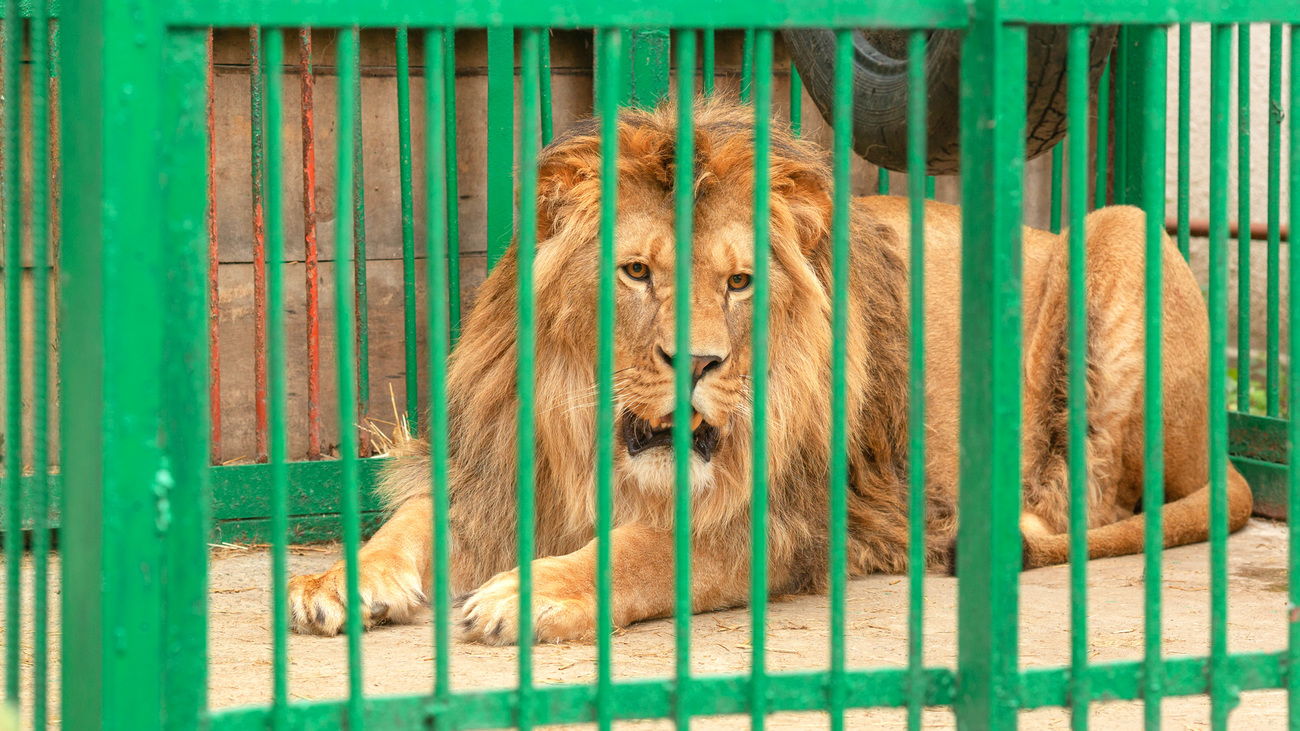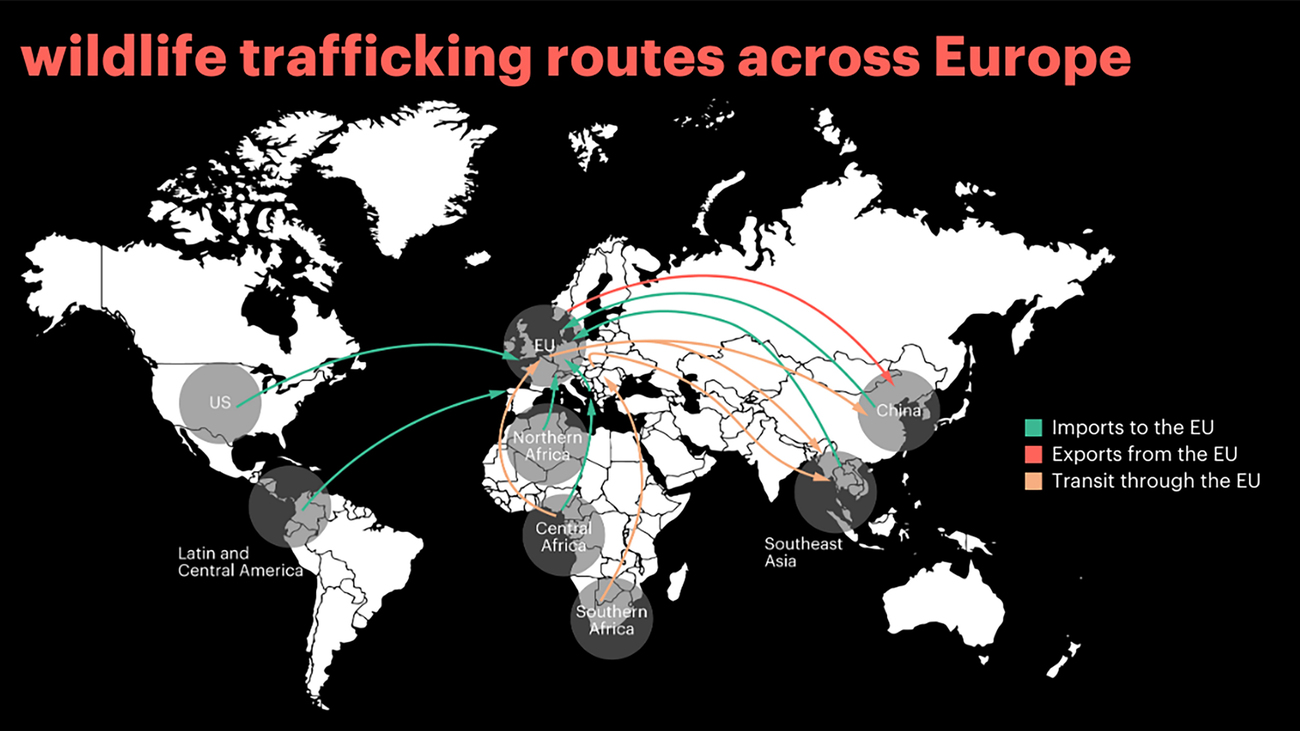Live Animals Seized in Trade - Global
Stopping smugglers is the first step, rescuing animals is the nextexotic wildlife trade rampant in Europe
exotic wildlife trade rampant in Europe

Five majestic lions—a male, a lioness, and her three cubs—rescued from Ukraine, have arrived safely in neighbouring Poland after a successful rescue effort.
This lion quintet is but one aspect of a broader rescue of 14 big cats transpiring in Ukraine in the coming weeks, proof positive that the exotic pet trade is thriving in Europe, even though these animals usually do not. After all, lions roam and hunt on savannahs in Africa, not on the often-icy soil of a country such as war-torn Ukraine.
For many people, cats of any size are attractive and appealing, and exotic ones can be a sign of wealth or status, says IFAW’s wildlife rescue program manager, Loïs Lelanchon. But whether small or large, they are not house pets, and can become dangerous and unmanageable.
Still, they’re trafficked in large numbers from country to country, usually after being bred in captivity, far from their country of origin. This means they may now live with private owners, or be “shown off” by a business, versus living free on the lands where they belong.
a central hub for the exotic pet trade
Across Europe, breeding of wildlife in captivity for the black market is a phenomenon that is “growing and fuelled by social media,” Lelanchon says. “We see big cat cubs and other wildlife regularly confiscated in several European countries.”
The problem goes beyond big cats. Many wildlife species are illegally collected in and exported from their country of origin. They can then be imported if not protected by international and EU legislation and traded legally in the EU, which experts label a hub, transit point, and destination for exotic pets.

animals abandoned in times of war
In the case of the big cats, IFAW worked with Wild Animal Rescue, a centre jointly operated by Natalia Popova and UAnimals near Kyiv in Ukraine, which discovered that the private owners in question did not provide appropriate care, used them for breeding (soon after the rescue operation, the lioness gave birth to three cubs), and could not keep them due to the hardships of the war with Russia.
Many animals are surrendered or abandoned when keeping them becomes too expensive. “As an example, due to the Russian invasion in Ukraine, the price of meat—which they eat—has increased drastically recently,” says Natalia Gozak, IFAW’s wildlife rescue field officer in Ukraine.
“When we think about animals in the context of war, we usually think first of companion animals,” she says. “With lions, it’s a far more advanced and complicated logistical challenge, even if just transporting by land, as with this rescue.”
curbing the trade in exotic wildlife
The growing trend in the exotic wildlife trade can be stopped with a combination of good policy and a good legal framework, says Lelanchon. “Enforcement of policies is the most important factor, and we as a society fall short with this as an issue of prioritisation, often due to budgeting.”
He says IFAW works closely with international governments to advise them on these critical policies, informed by IFAW’s fieldwork with conservation experts who think constantly about what can be improved, so illegal trade can end.
“It’s also about reducing demand for these animals and raising awareness, compassion, and empathy with the general public about the suffering of wild animals kept as pets,” Lelanchon says. “It’s about educating the general public that owning an exotic pet is not a good idea.”
In March 2022, IFAW drafted a legal document of model legislation with other parties based off of the U.S. Lacey Act of 1900, which prohibits the trade in wildlife, fish, and plants that have been illegally taken from the country of origin.
The organisations state in another report that existing legislation is insufficient to protect global biodiversity and combat all wildlife trafficking. It requests further international trade restrictions and stricter and harmonised national legislation.
many animals await rescue
IFAW, often in collaboration with other partners, has rescued more than 200 big cats and countless other wildlife species destined for the exotic pet trade globally.
Often, it’s not possible to release the animals back into the wild after they’ve spent time in captivity. “They can’t go back because they don’t have the skills to hunt, nor do they have social or behavioural skills to allow them to thrive with other animals of the same species,” says Gozak. “They may not be able to adapt to the weather in that location, nor to identify threats from predators.”
So IFAW works hard to find appropriate, respected, and closely vetted rescue centres, zoos, and sanctuaries, that operate with the highest quality animal welfare standards, she says—and those places are limited. Financial support is urgently needed to ensure rescued animals are provided care in adequate facilities.
The five lions rescued from Ukraine this week are currently in temporary quarantine at Poznań Zoo in Poland until they move on to a proper forever home.
But there’s still considerable work to do, with many more big cats in captivity awaiting rescue.
“A few months ago, we learned through our extensive networks, that approximately 200 big cats need rescue from Ukraine, because of unsuitable living conditions.”
IFAW continues to work tirelessly to end the illegal trade in wildlife and rescue impacted animals, in Europe and around the world.
Related content
Our work can’t get done without you. Please give what you can to help animals thrive.